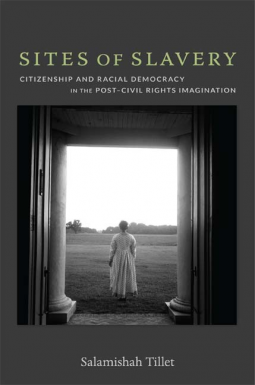
Sites of Slavery
Citizenship and Racial Democracy in the Post-Civil Rights
by Salamishah Tillet
This title was previously available on NetGalley and is now archived.
Send NetGalley books directly to your Kindle or Kindle app
1
To read on a Kindle or Kindle app, please add kindle@netgalley.com as an approved email address to receive files in your Amazon account. Click here for step-by-step instructions.
2
Also find your Kindle email address within your Amazon account, and enter it here.
Pub Date Aug 21 2012 | Archive Date Sep 01 2012
Description
More than forty years after the major victories of the civil rights movement, African Americans have a vexed relation to the civic myth of the United States as the land of equal opportunity and justice for all. In Sites of Slavery Salamishah Tillet examines how contemporary African American artists and intellectuals—including Annette Gordon-Reed, Barbara Chase-Riboud, Bill T. Jones, Carrie Mae Weems, and Kara Walker—turn to the subject of slavery in order understand and challenge the ongoing exclusion of African Americans from the founding narratives of the United States. She explains how they reconstruct "sites of slavery"—contested figures, events, memories, locations, and experiences related to chattel slavery—such as the allegations of a sexual relationship between Thomas Jefferson and Sally Hemings, the characters Uncle Tom and Topsy in Harriet Beecher Stowe's novel Uncle Tom's Cabin, African American tourism to slave forts in Ghana and Senegal, and the legal challenges posed by reparations movements. By claiming and recasting these sites of slavery, contemporary artists and intellectuals provide slaves with an interiority and subjectivity denied them in American history, register the civic estrangement experienced by African Americans in the post–civil rights era, and envision a more fully realized American democracy.
Salamishah Tillet is Assistant Professor of English and Africana Studies at the University of Pennsylvania. She is a cofounder of the nonprofit antiviolence organization A Long Walk Home. She is a regular contributor for the online magazine TheRoot.com. In 2006, Ebony named her one of America’s top 30 Black leaders under 30.
Advance Praise
"Sites of Slavery is an original contribution to the scholarship on memory, representation, and New World slavery. With keen insight and dazzling analysis, Salamishah Tillet attends to the implications that contemporary representations of slavery have for our understanding of the history of slavery in the United States and of African American identity. This book crosses disciplines to offer a compelling view of the many ways that slavery lives in the contemporary imagination and colors the way we see our past, our present, and our future."—Henry Louis Gates Jr., Alphonse Fletcher University Professor, Harvard University
"Sites of Slavery is a meticulously researched, persuasively argued, beautifully written and intellectually daring study of contemporary narratives of slavery. Through her dazzling readings of fiction, drama, dance, cinema, visual art, heritage tourism, reparations legal cases and critical race historiographies, Salamishah Tillet demonstrates how a range of African American artists, writers and intellectuals respond to the contemporary "crisis of citizenship" by foregrounding a "democratic aesthetic" in their representations of slavery. This book will transform the way we think about the place of African American cultural production in relation to "post civil rights era" political discourse."—Valerie Smith, author of Toni Morrison: Writing the Moral Imagination
Available Editions
| EDITION | Paperback |
| ISBN | 9780822352617 |
| PRICE | $23.95 (USD) |
| PAGES | 240 |



